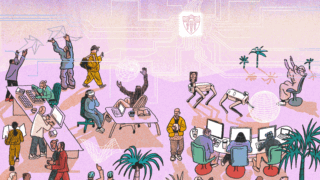
Despite economic challenges, USC experts predict that total spending on holiday shopping will rise, partly due to inflation. (Photo/iStock)
Inflation is no match for American holiday traditions
Americans are determined to keep the holiday spirit alive, despite rising costs, USC experts say. Even football games play an economic role.
Americans are preparing for a holiday season marked by both tradition and uncertainty: Cherished traditions like Thanksgiving Day football remain, but supply chain disruptions and inflationary pressures threaten to dampen the spirits of holiday shoppers.
“Despite a potential decrease in consumer spending power, the demand during the holiday season, especially around Black Friday, remains high,” said Nick Vyas, an associate professor of clinical data sciences and operations at the USC Marshall School of Business.
Consumer credit card debt is at an all-time high of over $1 trillion. The nationwide personal saving rate — the income left over after people spend money and pay taxes — is on a steady decline. Inflation continues to drive up the prices of goods and services, further straining Americans’ wallets.
Even so, USC experts predict that total holiday spending on gifts, food and other seasonal items will rise, partly due to inflation. While pay increases have not kept pace with recent or post-pandemic inflation levels, consumers are likely to spend to get what they are looking for this holiday season, experts say.
“Inflation has been with us for some time now and has come to be expected,” said Lars Perner, an expert in consumer behavior and an assistant professor of clinical marketing at USC Marshall. “Many consumers realize that with continued inflation, money will buy less in the future than what it does at the moment, even if savings receive modest interest.”
Holiday shopping: Americans gear up for Cyber Monday, Black Friday
Americans are ready to spend during the holiday season, and they’ll do so with a blend of traditional in-store shopping and online purchases.
Consumers are increasingly turning to online platforms for their holiday gift shopping, drawn to the convenience, wider selection and often better prices. But physical stores are expected to account for the majority of holiday spending, with some reports estimating that 80% of purchases will occur in brick-and-mortar settings.
“Cyber Monday is largely a historical relic,” Perner said. “From a technological point of view, there is no need for the event today when most households have high-speed internet access at home. In the old days, shopping could be much more convenient with faster internet connections available at work. Today, Cyber Monday has become an excuse for an additional round of sales.”
Are supply chains ready for holiday shopping?
Experts predict that the upcoming holiday shopping season will have its fair share of supply chain challenges, likely affecting Black Friday sales and promotions. Increased consumer demands can quickly overwhelm supply chains unprepared or recovering from previous disruptions, leading to stock shortages and potential customer dissatisfaction, Vyas said.
Global supply chains are still fraught with logistical bottlenecks, labor shortages and challenges stemming from ongoing geopolitical tensions, said Vyas, who is also the founding director of the USC Marshall Randall R. Kendrick Global Supply Chain Institute.
“Supply chain challenges persist in the U.S., with some reports indicating shipping times for many products still exceeding pre-pandemic levels by 20%-40%. This has a direct impact on product availability and pricing,” he said.
Despite challenges, experts see signs of strength and potential growth. Businesses have shown they can adjust supply chains based on past disruptions, making them more resilient against future shocks. Also, experts note that using advanced tech like artificial intelligence and blockchain helps make supply chains better and safer.
AI enables the analysis of vast amounts of data, leading to more accurate demand forecasting and inventory management, Vyas said, pointing to a recent McKinsey & Co. report showing that AI can slash forecasting errors by up to 50%. Blockchain technology complements AI by introducing an additional layer of transparency and security, Vyas said. Blockchain acts as a decentralized ledger that records and verifies all transactions, allowing companies to seamlessly track the movement of goods from origin to delivery.

American football is a constant
On Thanksgiving Day, millions of Americans gather around their televisions to watch their favorite teams battle it out on the gridiron. For many, it’s the highlight of the holiday season, a time to come together with family and friends to enjoy a shared passion.
“Thanksgiving Day football games are deeply woven into the fabric of American culture and tradition — it’s all about turkeys and touchdowns. We pride ourselves in competition and the heat of the battle,” said Lorena Martin, an assistant professor of clinical data sciences and operations at USC Marshall. “The remarkable athletic prowess, coupled with the elegance of the game’s strategy and fierce competition, is an exhilarating spectacle for sports fans around the world.” The economic significance of football is equally undeniable, said Martin, an expert in sports business, sports performance and data analytics.
The NFL, one of the world’s most lucrative sports leagues, generated $18.6 billion in revenue in 2022, eclipsing the earnings of several other major sporting leagues combined. NFL games provide a significant boost to host cities, particularly on high-profile days like Thanksgiving, she said.
“National broadcasts are valuable currency for all NFL franchises, as they provide an opportunity to expand their brand presence beyond their regional footprint and drive additional interest, and subsequently revenue, from that increased exposure,” said Courtney Brunious, an expert in sports business and an assistant professor of clinical management and organization at USC Marshall.
“Teams hosting or playing in Thanksgiving games are able to tap into a captive audience at home,” Brunious said, “which typically tunes in at amongst the highest rates of the season, or in the case of a venue, an audience that has built holiday traditions out of attending these games.”
Featured Experts
Courtney Brunious
Expert in sports business, sports and real estate, sports marketing and sports technology
Lars Perner
Expert in marketing, consumer psychology, bargain-hunting, “win-win” deals, psychology of gas price changes, Thanksgiving, “Black Friday” and holiday shopping, online shopping, marketing on the Internet, color and layout strategies in retail stores, product placement, consumer decision-making, advertising, branding, public relations campaigns, the Internet and consumer behavior, autism and Asperger’s syndrome and social responsibility
Nick Vyas
Expert in global trade, global supply chain, business operations, manufacturing and coronavirus/COVID-19 economic impact



